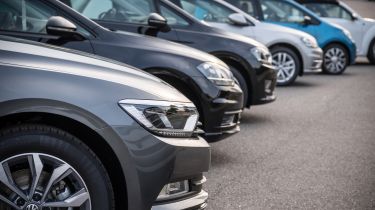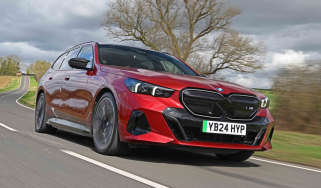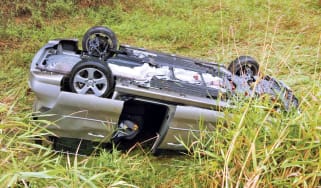What is car leasing and how does it work?
Have you considered hiring a car instead of buying it? That's what leasing agents and personal contract hire schemes offer...

If you’ve looked at car finance before, then you’re probably familiar with the idea of leasing. It’s one of the most common methods of putting a new vehicle on your driveway and due to its simplicity and relatively short terms, is of particular interest to people who like to get behind the wheel of something new every few years.
Of course, you shouldn’t go into any new financial commitment with your eyes closed though, and leasing certainly isn’t for everyone. Below, we’ve explained some of the basics of car leasing, why you might choose to do it, why you might want to avoid it, and what you’ll need to know before signing your name on the dotted line.
What is car leasing?
Car leasing, sometimes called personal contract hire or PCH, is effectively long term car rental, a contract where you pay for a car over a set period, and hand it back at the end of the finance term. You aren’t the owner of the car at any point, and unlike a personal contract purchase (PCP) deal, which otherwise has a similar structure, there’s no option to buy the car at the end - it goes back to the lease company and they sell it on.
How does leasing a car work?
In many ways, leasing isn’t dissimilar to PCP finance. After finding a car you’re interested in and ordering the vehicle through the finance provider, you’ll make an up-front deposit payment, and then commit to a monthly sum for a given period – typically two or three years depending on the lease deal.
This payment is essentially based on the car’s depreciation – you’re paying a sum based on how much it’ll be worth at the end of the period – but will vary depending on how much you’re willing to pay up front, and will be based on a mileage limit, with charges applying if you go over this limit.
Where leasing and PCP then diverge is that in PCP, you’ve got the option of actually buying the car at the end, by making a final “balloon” payment roughly equivalent (there’s usually some margin built in as a buffer) to the car’s guaranteed minimum future value (GMFV) established at the start of the contract.
With leasing however, the car simply goes back to the lease company, with no option to buy it. They’ll eventually sell the car on, and you can either walk away, or take out a new lease deal and go through the same process again, a little like you might if you opt not to make the balloon payment at the end of a PCP.
Another area where leasing often differs from PCP or hire purchase is that yearly tax and maintenance are usually built into the lease payments, and some will even include car insurance.
Advantages and disadvantages of leasing a car
No method of car financing is perfect, and some work better for some people than they do for others. Leasing is no different, and has its own advantages and disadvantages over more ownership-based finance deals. Below we’ve explored some of the benefits and negatives of car leasing.
Advantages of leasing a car
As leasing a car doesn’t give you any option for ownership, it could be considered the easiest way of financing a car, with the least commitment required. While you’ll still have mileage limits and have to account for any damage, leasing is a good way of getting to use and enjoy a new car every two or three years without fretting about balloon payments or whether things will start to go wrong after the lease period.
Lease deals often include tax and maintenance in the monthly payments too, and while this adds cost, it gives you fewer things to worry about during the lease period, since many of your costs are consolidated into one payment. There’s usually more flexibility over how long you’ll ‘own’ the car for as well. A two or three year lease is typical, but there are short-term options too, if you like changing your car as often as your jeans.
Disadvantages of leasing a car
If you like the idea of actually owning a car, and hanging onto it for longer than two or three years, then leasing isn’t for you, and you’ll need to look instead at PCP or hire purchase finance. But even without any burden of ownership you can’t just treat the car as a disposable object – for one you’ll likely be paying for the car’s upkeep in your monthly payments, and you’ll need to have it serviced on time if you don’t want to incur extra charges. Likewise, you’ll be liable for extra fees if you hand the car back dented, scraped and kerbed after the two or three years are up.
With upkeep costs often built into the monthly payment you may find lease deals a little more expensive than some PCP deals too, and remember that you won’t be building any equity with a lease – if the car happens to be worth more than expected at the end of the term, having depreciated more slowly than the lease company anticipated, then only the lease company benefits: you’ll effectively have paid over the odds each month.
Is it better to lease or buy a car?
Whether buying or leasing is better depends on your preferences or personal circumstances. If you like to change cars frequently, like the convenience of having maintenance rolled into your monthly payments, and don’t want to commit to ownership, then leasing could be ideal. If you want the experience and equity of car ownership, and have more options when your finance period comes to an end, then you may be better off looking at PCP or HP deals.
What do I need to lease a car?
Leasing a car requires similar documents to those you’d have to provide in any car finance transaction. A driving licence and proof of address (such as a utility bill) are the bare minimum, and most lease companies will want to see some kind of proof of income too, such as a few months’ worth of payslips or bank statements.
As a leasing company will check your credit score before allowing you to sign up, you might also want to check this in advance. It’s often still possible to lease on a low credit score, but you might be subject to higher interest rates, and will have to nominate a guarantor – essentially, someone responsible for your payments if you can’t afford them.
If you can’t keep up with the monthly payments, the car will be taken away – and it won’t do your credit rating any good either. So before you take out any finance contract, be sure you’re actually able to pay.
Frequently Asked Questions
If you can afford the monthly payments, like to change cars relatively frequently and have no dreams of ownership, then leasing could be the ideal way of financing a new car.
Click the links below to get full guides on each of the key car finance options...
How to pay for your new car
- Cash or credit card
- Personal loan
- Hire purchase (HP)
- Personal contract purchase (PCP)
- Personal contract hire and leasing
- Should you buy or lease your new car?
- Car finance examples: which type is cheapest?
Our dealer network has 1,000s of great value new cars in stock and available now right across the UK. Find your new car…









